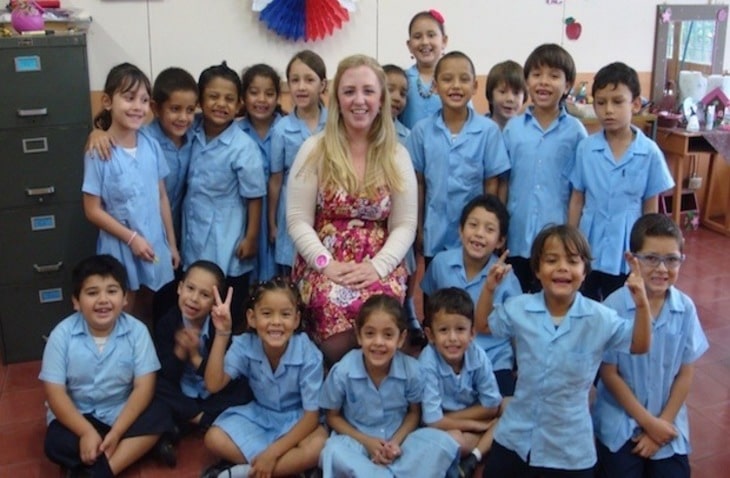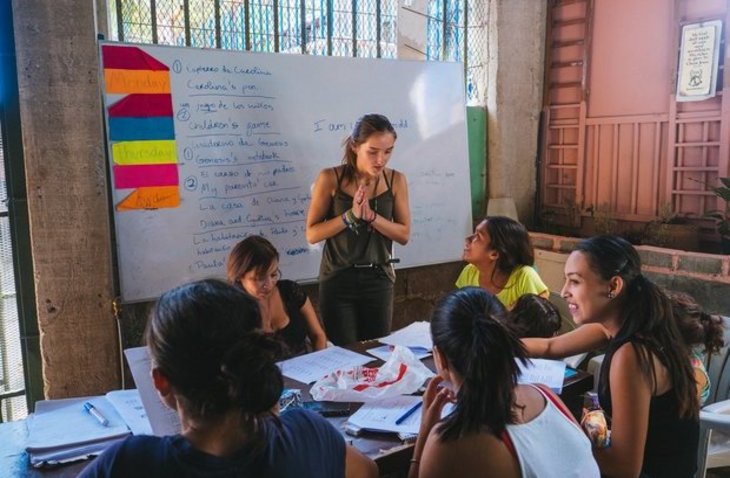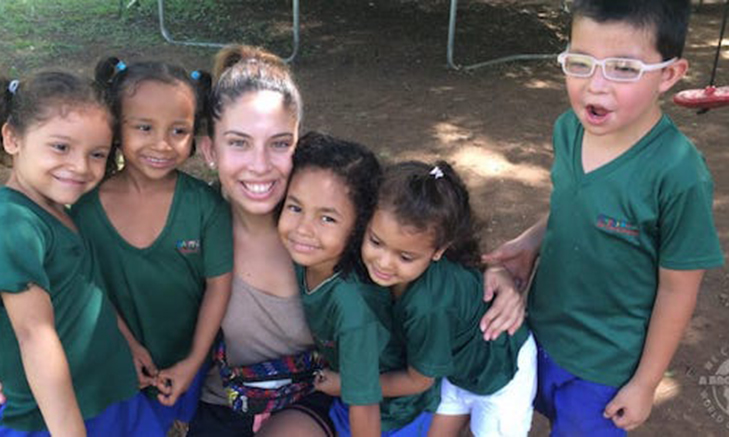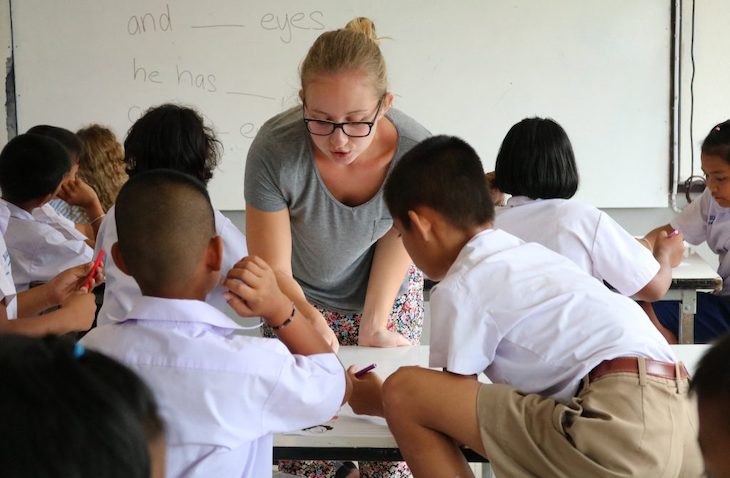Welcome to our comprehensive blog about teaching English in Costa Rica, where a unique cultural experience and a rewarding career path await you. This guide is designed to help you dive deep into teaching English to improve lives in a country where English proficiency is increasingly important, especially in the booming tourism sector, while soaking in the rich Costa Rican culture. The demand for English teachers is acute across numerous educational institutions.
English teaching opportunities are abundant in many educational sectors such as primary/secondary schools, language centers, and universities. Volunteer teaching projects open up even more opportunities in less formal settings that are able to reach the different populations. Volunteering to teach not only provides Costa Ricans the opportunities to improve English language skills but also fulfills their eagerness to practice conversing in English. There are plenty of volunteer projects available. You can choose from the picturesque beach town of Manuel Antonio, the bustling capital city of San Jose, or opt for more remote areas such as Santa Barbara De Heredia. These diverse locations offer a range of experiences, from mainstream to ‘off the beaten track’ adventures.
Costa Rica, a gem in Central America, is nestled between Nicaragua to the north and Panama to the south, with the vast Pacific Ocean to the west and the serene Caribbean Sea to the east. Despite its small size, roughly equivalent to a large city in the USA, Costa Rica is home to about 5 million people. This nation is a tapestry of diverse landscapes, offering everything from majestic mountain trails and aromatic coffee plantations to lush rainforests and breathtaking beaches.
Its cultural tapestry is woven with threads of its Spanish heritage, evident in the national language and customs. Costa Ricans are known for their happy, laid-back, and welcoming nature, contributing to the country’s reputation as a safe and harmonious place to live and work. The affordable cost of living attracts many foreigners to live and work here. English teachers can enjoy a comfortable lifestyle with reasonable living costs for housing, food, and transportation.
How to teach English in Costa Rica
Teaching English in Costa Rica can be an enriching experience, offering cultural immersion and the opportunity to impact the lives of students. If you’re considering this career path, here’s a checklist to get you started:
- Qualifications: Start by obtaining a bachelor’s degree and a TEFL certification. These are essential for boosting job prospects. Additionally, some institutions might require an English proficiency test.
- Job Market Research: Explore different areas within Costa Rica. While larger cities may offer more job opportunities, they also tend to have higher competition and living costs.
- Preparation of Documents: Ensure your passport is valid and gather important documents such as diplomas, certificates, CVs, and reference letters. Remember, some documents might need translation into Spanish.
- Job Application: You can apply for jobs either online or in person. Pay close attention to contract details, especially if they’re written in Spanish.
- Work Visa: After receiving a job offer, apply for a work visa at a Costa Rican embassy or consulate.
- Travel Planning: Once your visa is approved, organize your travel and accommodation. It’s also wise to familiarize yourself with local customs and the cost of living in Costa Rica.
- Start Teaching: On arrival, report to your employer, finalize your living arrangements, and embark on your teaching career.
- Continuous Learning: Enhance your teaching skills through workshops and by networking with fellow educators. Learning Spanish is also beneficial for a deeper connection with the culture and community.
- Building Independence: As you gain experience, you might consider becoming an independent teacher. This allows more control over your schedule and rates. Building a strong client base is crucial for this transition.
Can I teach English in Costa Rica without a degree?
Yes, teaching English in Costa Rica without a degree is feasible, but the available opportunities differ. Academic schools often require a degree or TEFL certification. In contrast, institutions focusing on business English prefer teachers with a background in specific business or technical fields. Other settings, like conversational English classes, might be more lenient if you have proficient English skills and some teaching experience.
However, lacking a degree can pose challenges in securing work permits or higher-paying roles. While Costa Rica welcomes English teachers from diverse educational backgrounds, a bachelor’s degree can open doors to more lucrative opportunities.
To enhance your prospects, consider obtaining TEFL certification, demonstrating commitment and equipping you with essential teaching skills. Building connections with local language schools or English learning communities in Costa Rica can also aid in finding opportunities.
For those seeking a more enriching experience beyond traditional teaching, volunteering to teach English presents a unique avenue. Volunteer positions, usually unpaid, typically have more relaxed requirements, allowing for a broader range of participants. These roles are ideal for those looking to contribute positively without the formalities of a traditional job.
Do I need to know Spanish to Teach English in Costa Rica?
The short answer is, not necessarily. Many schools and language institutes in Costa Rica prefer that English teachers communicate exclusively in English, especially in the classroom, to create an immersive learning environment. This approach is based on the principle that maximum exposure to English enhances the students’ language acquisition. Therefore, knowing Spanish is not a strict requirement for teaching English in Costa Rica.
However, having a basic understanding of Spanish can be beneficial in several ways:
- Classroom Management: A basic grasp of Spanish can be helpful for managing classroom dynamics, particularly with students who are absolute beginners in English.
- Day-to-Day Living: Outside of the professional setting, knowing some Spanish can greatly ease daily life in Costa Rica. It can assist in simple tasks like shopping, navigating public transport, and interacting with locals.
- Cultural Understanding: Learning Spanish allows for a richer cultural experience. It helps you connect with the local community, understand cultural nuances, and enjoy a more fulfilling stay in Costa Rica.
- Career Flexibility: While not essential, some language schools might view Spanish proficiency as a valuable additional skill. It could potentially open up opportunities for roles that require bilingual communication.
So, while you don’t necessarily need to know Spanish to teach English in Costa Rica, having some knowledge of the language can enhance your overall experience and assist you in navigating life outside the classroom.

Make sure you have all your paperwork in order before embarking on your Costa Rican Adventure!
Trending Guidebooks
Volunteering Abroad AFTER the Coronavirus Outbreak
Read 25,959 times2025 Best Internships Abroad: Medical Care, Marine Biology & More
Read 89,754 timesVolunteer in Australia: Animals, Conservation, Ranching and More
Read 49,436 times2025 Best Volunteer Abroad Programs, Organizations, and Projects
Read 3,649,348 times
Do I need a Visa to teach English in Costa Rica?
Costa Rica allows tourists from all countries, and this inclusivity simplifies the process for many aspiring English teachers looking to experience Costa Rica’s rich culture and natural beauty. If you’re looking into how to be an English teacher in Costa Rica temporarily (less than 90 days) and your main goal is to only teach English for the experience rather than being paid, you will be able to enter Costa Rica as a tourist, based on the following criteria:
- Return Flight Ticket
- Duration of Stay Based on Nationality
- Economic Solvency
- Discretion of Stay Duration
- Valid Passport and Proof of Exit
For more details, check out the Costa Rica entry requirements here.
Organizations to Volunteer to Teach in Costa Rica
You can avoid the hassles of paperwork by partnering with a reputable volunteer organization, and here are our favourites:
- Maximo Nivel has been offering diverse educational and volunteer programs in Latin America and is acclaimed for its global accreditations.
- International TEFL Academy offers globally recognized TEFL courses and extensive graduate support for those teaching English worldwide.
- IVHQ excels in sustainable global volunteering, having placed over 132,000 volunteers in more than 42 countries.
- GoEco offers over 150 volunteer programs in 40+ countries, emphasizing sustainability and responsible travel. It has now become a notable organization in volunteer tourism, sending 2,000+ volunteers yearly.
- Involvement Volunteers International (IVI) focuses on ethical and sustainable community development, having engaged over 25,000 volunteers in 23 countries.
- Volunteering Solutions (VolSol) provides impactful healthcare and education projects across 26 countries.
- Global Vision International (GVI) is celebrated for sending over 35,000 volunteers abroad, focusing on sustainable projects from animal care to citizen science. GVI supports participants with scholarships and upholds a highly intentional Badge of Ethics symbolizing their commitment to empowerment and measurable impact.
Volunteering to teach offers a glimpse of teaching in Costa Rica without a long commitment. Use your volunteer experience to gain teaching experience to boost your resume, start an international network, understand the culture and lifestyle, and learn more Spanish. This experience will prepare you for a career as an international teacher. Here are our top picks to volunteer to teach English in Costa Rica.
Volunteers for Maximo Nivel’s English Teaching program need to be at least 16 years old, with some projects requiring them to be 18. The programs demand creativity, hard work, and a positive mindset, with a background check required for those working with children.
Volunteers are engaged for 3 to 4 hours per day, Monday through Friday, with work hours varying between morning and afternoon. The program fee includes airport pickup, shared room accommodations in host families, and two meals per day (breakfast and dinner). They also receive an official certificate of volunteer service and a letter of recommendation.
In addition to volunteer opportunities, Maximo Nivel offers a TEFL Certification program in Manuel Antonio. The program requires participants to be at least 18 years old and academically prepared for university-level work. It involves academic work including the submission of two papers and a final portfolio.
The TEFL Certification course at Maximo Nivel is a comprehensive 4-week, 150-hour program available in a hybrid format that combines online and onsite learning. The onsite sessions are held in a tranquil open-air training center, surrounded by beaches and rainforests, providing an idyllic setting for study. Maximo Nivel has facilities in various locations: the San Jose Institute is in the university district of San Pedro, while the Manuel Antonio Institute is an open-air facility perched atop a mountain, offering stunning views of the Pacific Ocean and nestled amidst rainforests and beaches.
Participants have the option to stay with a host family or rent an apartment, allowing for flexibility in accommodation. The program also includes job placement assistance for its graduates, enhancing its appeal to those aspiring to become English teachers.
Overall, Maximo Nivel’s programs in Costa Rica offer a blend of cultural immersion, educational development, and practical work experience in a stunning natural setting, appealing to those looking to make a meaningful contribution while experiencing one of the world’s most sustainable countries.
The TEFL certification courses in Latin and South America, are intensive 4-week courses, running from 9 am to 6 pm on weekdays, and are designed for those aspiring to teach English abroad.
The Heredia course is led by experienced university-level professors and includes a minimum of 100 hours of academic coursework and at least 6 hours of observed student teaching with ESL students. Participants typically have 10-12 classmates, and the practical teaching component is often conducted in the evenings.
Students are expected to be engaged in class activities, lesson planning, and student teaching, with additional homework assignments like lesson plans, reflections, essays, and quizzes.
Course fees include interactive instruction, live practice teaching, small class sizes, and lifetime job search support. The course equips students with essential teaching skills, including grammar, classroom management, lesson planning, and various teaching methods for different levels and aspects of English.
Overall, ITA’s TEFL courses in Latin America provide comprehensive training for those looking to start a career in English teaching abroad, combining academic rigor with practical teaching experience.
The International Volunteer HQ’s Teaching English Volunteer Project in Costa Rica, available in Manuel Antonio and San José, offers volunteers the chance to teach English, benefiting students in tourism-driven areas. The program, aligning with the UN’s Sustainable Development Goals, starts every Monday, with costs beginning at $1165 for three weeks in Manuel Antonio and $445 for a week in San José. It includes teaching in various settings, local homestay accommodation, and opportunities for cultural immersion and Spanish learning. Suitable for individuals and families aged 16 and up, it involves up to five hours of daily volunteering. The San José program focuses on aiding low-income communities, while both locations provide comprehensive support like meals, airport pickup, and continuous assistance, fostering volunteer personal growth and contributing to Costa Rica’s educational landscape.
Embark on a transformative journey in Costa Rica, where volunteering transcends cultural boundaries and leaves a lasting impact. This program, based in San José, beckons those eager to contribute to the well-being of underprivileged children. Immerse yourself in meaningful volunteer work, spending 3-4 hours a day, Monday to Friday, on projects ranging from teaching English to planning creative workshops in music, dance, and arts. As you enhance your childcare and teaching skills, experience the warmth of Costa Rican hospitality through a homestay with half-board, fostering cultural exchange. Additionally, weekends are free to explore San José and its captivating surroundings, making this a holistic volunteer adventure.
The English Teaching Costa Rica program with IVI addresses educational challenges in Costa Rica, particularly in rural areas where poverty and limited resources affect access to quality education. Volunteers teach English to children and adults in schools and community centers, enhancing their job prospects and educational opportunities.
Before starting, volunteers undergo an introductory ESL course to prepare them for creating lesson plans and conducting classes effectively. The program operates in Manuel Antonio, known for its beaches and biodiversity, and San José, the culturally rich capital city. Volunteers stay in homestays, offering cultural immersion and a chance to experience local life.
The program requires a minimum one-week commitment in San José and three weeks in Manuel Antonio, open to individuals aged 16 and above. Tasks include teaching, tutoring, and engaging students in educational activities. The fees cover accommodation, meals, airport pickup, and ongoing support.
This initiative offers a unique opportunity to impact local communities through education while experiencing the diverse culture and natural beauty of Costa Rica.

Use your creativity to engage students and help in their English Learning
The Volunteer Teaching English in Costa Rica program by VolSol, based in Santa Barbara De Heredia, offers a chance to teach English to primary and middle school students in schools, community centers, and childcare centers. Volunteers assist local teachers, plan and conduct lessons, and engage in interactive activities to improve students’ English skills, crucial for better career opportunities in a tourism-driven economy.
Participants work 5-6 hours daily, Monday to Friday, and are involved in various teaching activities. The program is open to individuals 17 years or older, requiring a clean criminal background check and a flexible, enthusiastic attitude. Knowledge of Spanish is helpful but not mandatory.
The program includes comfortable accommodations with local host families, providing cultural immersion and language practice. Volunteers receive two daily cooked meals featuring local cuisine. During free time, exploring the beautiful areas of Heredia, San Jose, and Costa Rica’s natural attractions is encouraged.
Fees cover airport pickup, accommodation, meals, orientation, and ongoing support. An optional Spanish Immersion Week is available for a deeper cultural experience and language learning before starting the teaching program.
Embark on impactful journeys with two transformative programs in Costa Rica: The Teaching English and Community Development Volunteer Project or get a kick start on your English teaching career with this Teaching Internship. Spanning between 2 to 12 weeks, these initiatives aim to create a more equitable future through locally-led project work aligned with UN Sustainable Development Goals.
In the picturesque town of Cartago, volunteers and interns engage in classroom-based childhood development, English language teaching, and experiential education. The programs offer a unique blend of cultural immersion, ethical community engagement, and skill-building.
Participants lead English classes, support community education, and contribute to environmental and life skills initiatives. The itineraries include teaching sessions, ethics training, and personal development activities, fostering leadership, resilience, and cross-cultural communication. Whether you choose the volunteer or internship route, you’ll actively contribute to a better world while immersing yourself in the beautiful Cartago community and its rich Afro-Caribbean culture.
Ready to start your career Teaching English in Costa Rica?

Embrace the Journey of Teaching English in Costa Rica
Teaching English in Costa Rica is more than imparting language skills; it’s about connecting with people from diverse backgrounds, understanding their aspirations, and contributing to their futures. Volunteering as an English teacher in Costa Rica is more than just an opportunity to teach—it’s a comprehensive experience that contributes to professional growth, cultural understanding, language acquisition, and personal development.
































Munira Maricar · Travel Writer
With an international living background spanning Singapore, Qatar, Japan, and Mexico, Munira enjoys sharing insights on immersive travel while emphasizing the vital role of cultural respect and ethical engagement. Her extensive experience offers a unique perspective that inspires others to explore the world through service, ensuring that every journey respects and contributes positively to local traditions and communities.